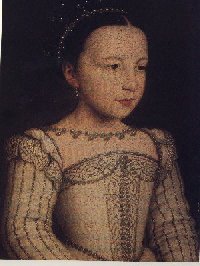 |
| Young Marguerite |
Four days after the wedding, a group of assassinations took place in France. After that, mob violence reigned the streets. Some believed that Marguerite's mother, Catherine de' Medici, had incited the riots because of the large numbers of Catholics in France at the time.

Marguerite spent much time at her brother's court, before being expelled for her affairs in the 1580's. She was then forced to return to Navarre, her husband's court, even though he no longer wanted her there. She was unsettled at court, where no one cared about her. As a final rebellion, she arranged for a plan to defeat her husband. She was caught and banished to a castle far away from court life for eighteen years.
Marguerite and Henry no longer had any sort of contact, and both had widely known affairs. The annulment of their marriage was finalized in 1599, after which she would no longer be married to Henry, but would still hold her titles.
After her husband's remarriage to Marie de' Medici, Marguerite returned to court, where she was more accepted. While there, Marguerite worked on her writing, which she had begun in her young adult years. She was interested in the world around her, especially those she knew well. She studied her brothers and husband and wrote about them, hoping to record things about her country for those in the future. She was also said to have been exceedingly generous in her later years, organizing events for the poor. At court, she promoted the arts and comprehensive education for noble children.
It's sad that Marguerite is remembered in a bad light, when she was someone who did everything she could to help others. She made no more mistakes then her husband, but she was held more accountable, because she was a woman. She was someone who tried to control her own destiny and conform to her own rules - not other's expectations - and was shamed for it because it didn't fit into the mold. Whether or not she was a dutiful was, Marguerite was an important part of the history of France, and made positive contributions.
Marguerite didn't listen to what the men in her life told her to do, instead doing what she wanted. Many women today are also expected to listen to the men in their lives and do what they're told, when really they should be challenging the rules they've been given, and learning.